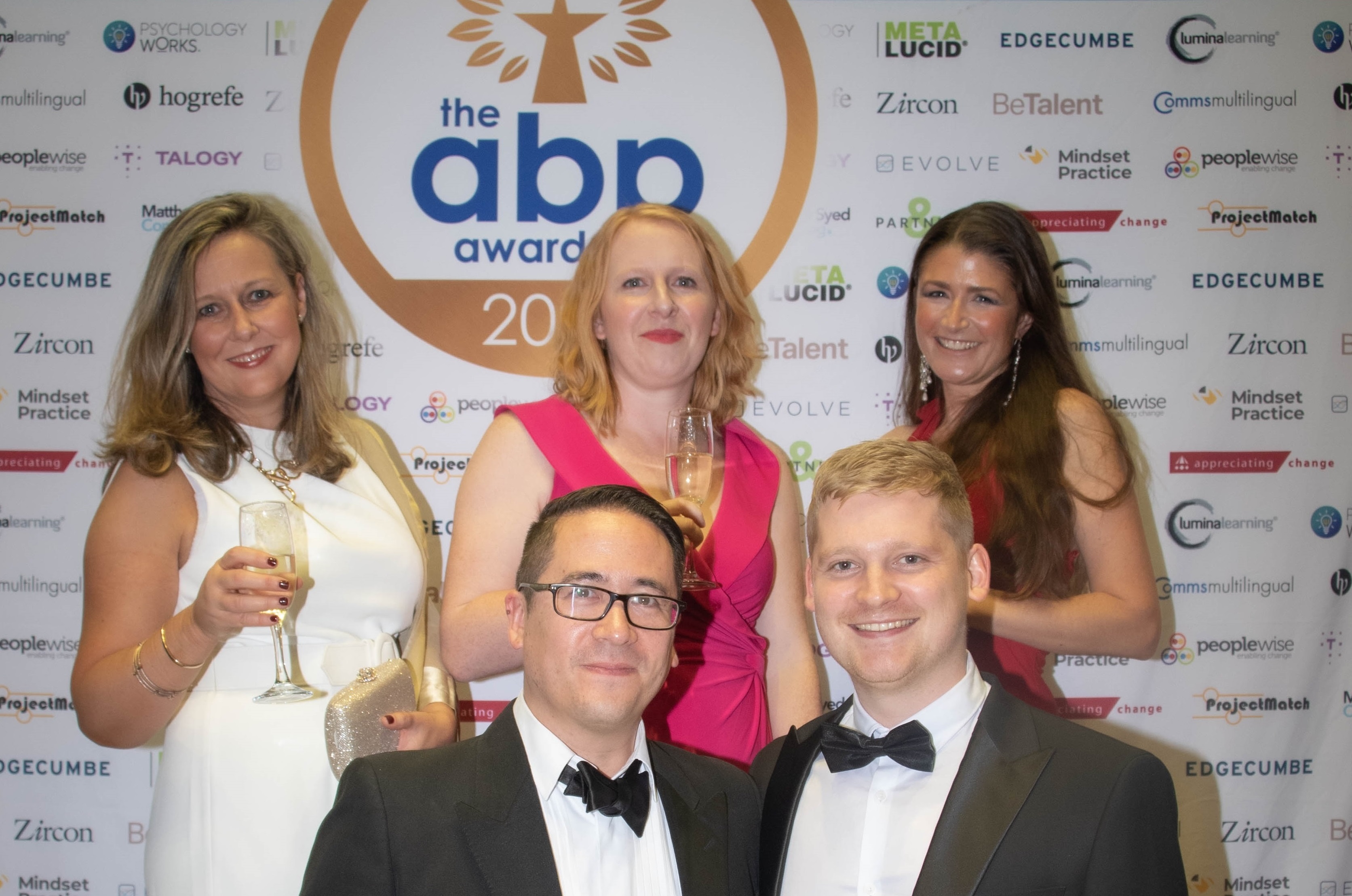The ABP conference and awards is an annual event hosted by the Association for Business Psychology. This year, its theme was the ‘Great Reflection’, looking at the impact of the pandemic on businesses and individuals, and how we can move forward in a post-pandemic world. The last two+ years has been one huge global experiment in relation to where we work, what we do, how we do it and even why we do it. This year’s conference provided a space for practitioners and academics to come together, reflect on the past two years, share what worked, and what did not, in order to generate new learning we can all take forward to develop a thriving post pandemic world of work.
We were thrilled to be a finalist for the ‘Excellence in Assessment & Selection’ category at this year’s awards. Although we didn’t win on the night, it was a great evening, mid-way through an exciting conference, and it was an opportunity to celebrate all the amazing work that is being done to support people, teams and organisations thrive post-pandemic. We’re all heading back to work this week with the ‘never say die’ attitude, and we couldn’t be prouder of our team for their ongoing effort and commitment. Our congratulations to the deserved winners in our category, Work Psychology Group, whose award submission was based on its review of the statutory consultation process, part of the selection process for judicial appointments.
Key insights from the conference
We were thrilled to have the opportunity to speak at this year’s conference, both at our workshop and at the awards finalists round table event. Our workshop was based on research we conducted this summer with over 70 talent, HR and L&D professionals exploring the issues currently keeping business leaders up at night regarding finding, developing and retaining talent. Based on this research and a literature review of the latest research and thinking in the field, we assert that a new, more systemic and ‘joined-up’ approach to talent management is required and we discussed some of the foundations for how this can be achieved, including a people assessment tool that can be used across all levels of organsiations and throughout the employee lifecycle. There are plenty more practical tips and tools contained in our whitepaper. Get in touch if you would like a copy.
Our award submission, which we discussed with conference attendees at the innovative round table ‘speed dating’ event, was based on our work over the past two years with Hargreaves Lansdown. We’ve supported HL to assess and develop their leadership capability as part of their business transformation programme. You can access our case study here.
In between our talks and meeting lots of interesting and like-minded people on our exhibition stand, we were delighted to be able to see some of the other inspirational sessions at the conference – here are a few of our highlights:
- Matthew Syed: Matthew works with an impressive portfolio of global clients in the public and private sectors. Building on his work as a best-selling author of titles such as Black Box Thinking, and Rebel Ideas. The influential thought-leader talked about the competitive advantage offered by fostering a thriving growth mindset culture and the power of cognitive diversity that strengthens and drives higher performance in individuals, teams and organisations.
- Andrew Whyatt-Sames (Q.o.Q Business Psychologists) gave an insightful and engaging talk on his review of the latest thinking about how managers can create high performance in their teams and organisations in our new post-pandemic hybrid working world. He concluded that there was no silver bullet and the important factors have not changed much (empathy, designing interactions and creating meaning), but their application needs to be adapted to our new normal.
- Jemma Pomfrey (Arup) spoke about personality and behaviours in relation to working from home based on research into the characteristics that are more suited to home working. Those with a more structured routine of work/life balance seemed to cope better than those who were more flexible due to a higher chance of burnout where the boundaries between work and home are blurred. Equally, those higher on sociability struggled. Jemma also reported that a climate of psychological safety is deemed as harder for a company to achieve or have control over when people are working remotely.
- James Bywater (Korn Ferry). Interesting insights on how the landscape of selling business psychology services has changed in terms of what is important to buyers. Organisational purchases are getting bigger, longer and more complex, with more of an emphasis of wanting an upfront demonstration of ROI from sellers (although we know that there is little value in putting an upfront figure on these services due to the importance of collaborating with clients to help them work out what ROI/success actually means for their organisation and for the different types of buyers and stakeholders within it). Providers must understand that there is little merit in trying to ‘sell’; rather we should be helping organisations to understand their issues by listening actively and providing expert insight.
Making it to the shortlist in the Excellence in Assessment & Selection category really is a huge accomplishment and it is a joy to see our efforts recognised. We will continue to strive for excellence and help our clients to create organisations that can thrive. To find out more about our work, please get in touch.




















